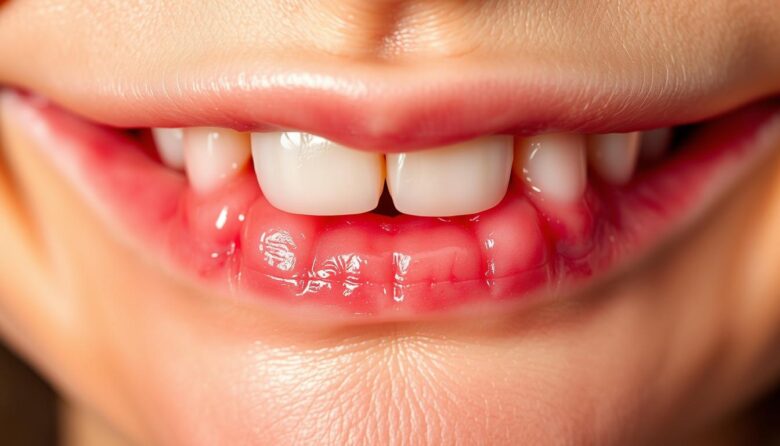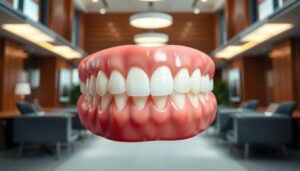Good gum health is key for a bright smile and overall well-being. This guide will show you how to keep your gums healthy and prevent gum disease. You’ll learn important tips for better oral health and how to prevent gum disease.
Strong gums are essential for avoiding gum problems like gingivitis and periodontal disease. This leads to better dental care and a better life.
Understanding the Importance of Gum Health
Gum health is key to a healthy mouth. Healthy gums protect teeth from harmful bacteria. Good periodontal care keeps teeth stable and the mouth healthy.
Knowing how important gums are helps us prevent gum disease. This way, we can keep our mouths healthy.
The Role of Gums in Oral Health
Gums are vital for our teeth. They keep teeth in place and support the dental structure. Healthy gums help us chew and speak well.
Ignoring gum health can lead to periodontal disease. This weakens the gums’ support. Regular dental visits and good oral hygiene are essential for healthy gums.
How Gum Disease Affects Overall Health
Gum disease is not just a mouth problem. It can also affect our overall health. It may be linked to heart disease and diabetes.
Inflammation from gum disease can spread through the blood. This increases health risks. So, keeping gums healthy is important for our overall well-being.
Signs of Healthy vs. Unhealthy Gums
It’s important to know the signs of healthy and unhealthy gums. Healthy gums help keep your teeth clean. Catching gum disease early can help prevent it from getting worse. Knowing the difference helps you take better care of your gums.
What Healthy Gums Look Like
Healthy gums are light pink and feel firm. They fit tightly around your teeth without swelling. Here are the main signs of healthy gums:
- Firm texture
- Uniform pink appearance
- No signs of bleeding during brushing or flossing
Common Symptoms of Gum Disease
Unhealthy gums show warning signs of gum disease. Spotting these signs early helps improve your dental care. Look out for these signs of gum disease:
- Swollen or inflamed gums
- Redness or discoloration
- Bleeding during brushing or flossing
- Persistent bad breath
Everyday Habits to Improve Gum Health
Developing daily habits is key to better gum health. Good practices like brushing, flossing, and using mouthwash are crucial. These actions help keep gums strong and your mouth clean. By following these tips, you can keep your gums healthy and your smile bright.
Effective Brushing Techniques
Brushing is the base of good oral care and is vital for gum health. To brush right, follow these steps:
- Use a soft-bristled toothbrush to avoid gum irritation.
- Brush for at least two minutes, making sure to cover all areas.
- Hold the brush at a 45-degree angle to clean the gum line.
- Use circular motions to massage your gums and remove plaque.
The Importance of Flossing
Flossing is key for removing food and plaque between teeth. It helps keep gums healthy and prevents gum disease. Flossing daily, along with using gum health products, is important for your mouth’s health.
Mouthwash and Its Benefits
Mouthwash offers extra protection for your gums. It kills bacteria and prevents plaque. Choose mouthwash with antibacterial ingredients for better results. Plus, it leaves your mouth feeling fresh, making you want to keep up with your oral care.
Dietary Choices for Stronger Gums
Keeping your gums healthy starts with what you eat. Some foods are better than others for your gums. Adding certain foods to your diet can really help.
Nutrients That Support Gum Health
Some vitamins and minerals are great for your gums. Here are the important ones:
- Vitamin C – You can find it in citrus fruits, strawberries, and bell peppers. It helps fix gum tissue.
- Calcium – Important for teeth, you can get it from dairy, leafy greens, and some alternatives.
- Antioxidants – In fruits and veggies, they fight inflammation and protect your mouth.
Foods to Avoid for Better Gum Health
Some foods can hurt your gums. It’s best to eat less of these:
- Sugary foods – Too much sugar feeds bad mouth bacteria, leading to gum disease.
- Processed foods – They have additives that can cause inflammation and gum problems.
- Acidic beverages – Drinks like soda and citrus juices can damage enamel and weaken gums.
Professional Dental Care Options
Keeping your gums healthy is more than just brushing and flossing every day. Getting professional dental care is key to good periodontal care and stopping gum disease. Regular dentist visits can spot problems early and stop them from getting worse.
Regular Dental Check-Ups
Going to the dentist regularly is crucial for gum health checks. Dentists can see how your gums are doing, look for signs of inflammation, and give tips on better oral care. These visits also offer a chance for a professional cleaning to remove plaque and tartar missed by brushing.
It’s important to keep these appointments to prevent gum disease effectively.
Deep Cleaning and Scaling
Deep cleaning and scaling remove tartar and plaque from below the gum line. This is especially important for those at risk of gum disease. Scaling cleans the teeth and roots thoroughly, addressing existing issues.
This procedure is a big part of keeping your gums healthy and is essential for a complete dental care routine.
Natural Remedies for Enhancing Gum Health
Looking into natural remedies can be a good choice for those wanting to avoid traditional gum care products. Many herbal treatments and essential oils are popular for their ability to improve gum health.
Herbal Treatments and Their Benefits
Herbs like aloe vera and turmeric are known for their anti-inflammatory and antibacterial effects. These natural options can soothe and heal gums. Aloe vera gel applied directly to the gums can offer relief and aid in healing.
Turmeric, rich in curcumin, can be made into a paste for use on gums. This helps promote gum health.
Essential Oils for Oral Care
Essential oils are great for boosting oral hygiene routines. Tea tree oil is especially useful due to its antiseptic properties. It’s often used in gum care products.
Adding a few drops of tea tree oil to water makes a good mouthwash. It fights harmful bacteria. Peppermint oil also refreshes breath and has antimicrobial qualities that help gums stay healthy.
The Connection Between Gum Health and Lifestyle
Knowing how lifestyle affects gum health can really help improve oral care. Choices like smoking and managing stress are key to gum health. They can either help or hurt your gums.
Smoking and Its Impact on Gums
Smoking is a big risk for gum disease. Tobacco chemicals cause inflammation and block blood flow to the gums. This makes healing harder. Smokers face a higher risk of periodontal disease, so quitting is crucial for gum health.
Stress Management and Gum Health
Stress can harm gum health, leading to more inflammation and infection risk. Using stress-reducing activities like mindfulness, exercise, and relaxation can help. It’s important to see how emotional health affects oral health for a balanced lifestyle.
The Role of Genetics in Gum Health
Genetics play a big role in gum health. Some people are more likely to get gum disease because of their genes. Knowing this can help them take better care of their teeth and gums.
Understanding Genetic Predispositions
Genes can make some people more prone to gum problems. Studies show that certain genes can weaken the immune system. This makes it harder for some to fight off gum infections.
Knowing your genetic makeup can help you take better care of your teeth. You can adjust your oral hygiene routine to meet your specific needs.
Coping with Family History of Gum Disease
If your family has a history of gum disease, you need to be extra careful. Regular dental check-ups are key. They help catch problems early and prevent them from getting worse.
Here are some ways to manage your risk:
- Stick to a strict dental hygiene routine every day.
- Use mouthwash that’s good for your gums.
- Talk to your dentist about a care plan that’s right for you.
Advanced Treatments for Severe Gum Issues
When you face severe gum problems, simple treatments might not work. Advanced treatments offer real solutions to fix gum health. Knowing about these methods helps you make better choices for your teeth.
Gum Grafting Procedures
Gum grafting is a key surgery for serious gum issues. It takes gum tissue from another part of your mouth or uses synthetic materials. This helps cover exposed roots and grows new tissue, fighting recession and improving looks.
Laser Treatments for Gum Disease
Laser treatments are becoming more common for gum disease. They use light to kill infected gum tissue, causing less pain and quick healing. People often see less bleeding and faster recovery, making lasers a top choice.
Maintaining Long-Term Gum Health
To keep your gums healthy for a long time, it’s key to have a daily oral care routine. Brush your teeth at least twice a day with fluoride toothpaste. Also, floss and use mouthwash to help your gums stay healthy. These steps help remove plaque and food bits and make your gums stronger.
Establishing a Daily Oral Hygiene Routine
Brushing and flossing regularly are just the start. You should also see your dentist for check-ups. These visits help catch problems early, so you can act fast. Brushing gently in circles is also important for your gums.
Monitoring Changes in Gum Condition
Checking your gums regularly can help spot issues early. Look out for redness, swelling, or bleeding. Taking action early can prevent serious problems. This approach helps keep your gums strong and healthy for life.




